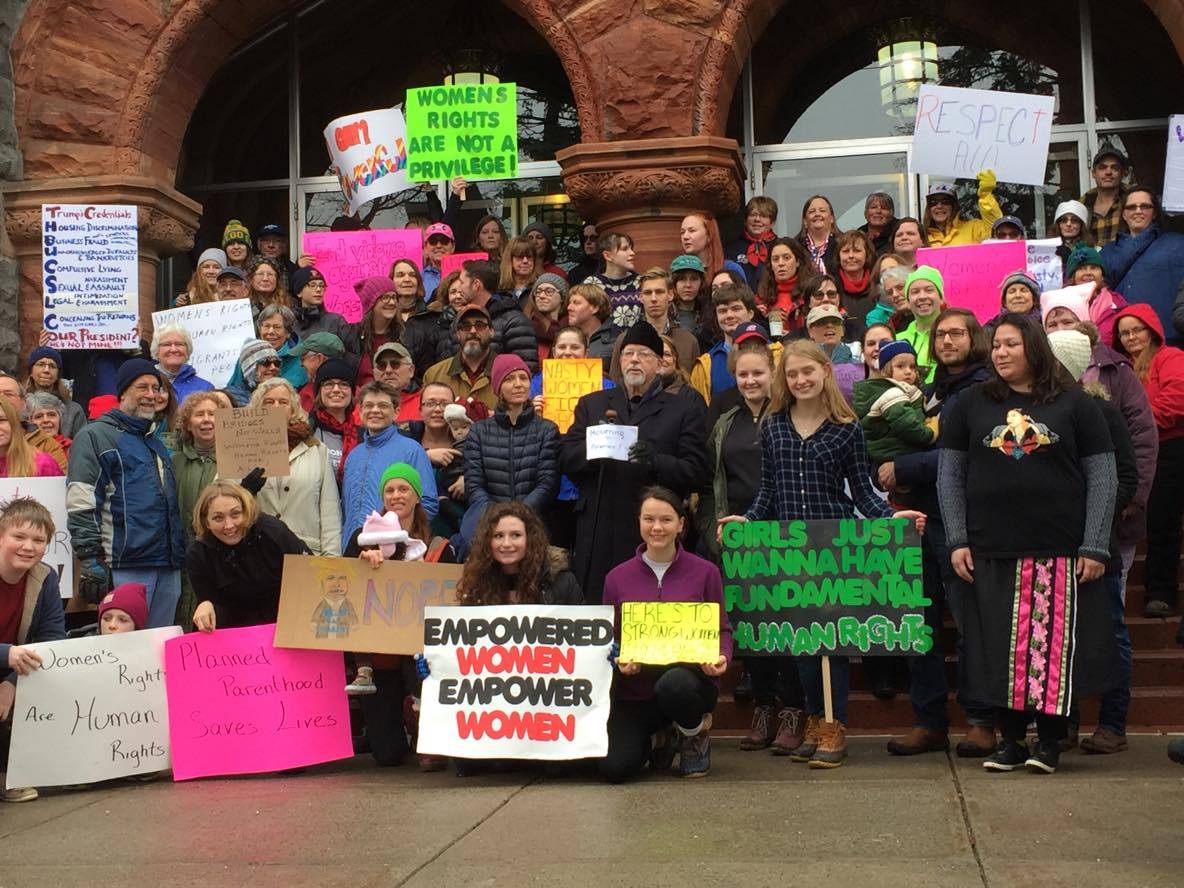Last Saturday, January 21st, over 100 people marched through the slushy streets of Canton, NY in solidarity with similar women’s marches across the globe. Despite poor weather, spirits were high. Supporters carried signs that protested the policies and views expressed by newly inaugurated President Trump and supported organizations like Planned Parenthood. The success of the Women’s March raises questions about the optimism of the people (or lack thereof) in the upcoming years, as well as the effectiveness of grassroots movements.
The Canton march was organized by two high school students, Anna Ladouceur and Marley Davis. They felt compelled to organize after hearing about the Women’s March on Washington via social media. “We set that up on Thursday, we got the page up at about 2 p.m., and then Marley sent an ad to North Country Now. This morning we predicted about 30 people were coming, but I think the turnout was actually 135, so it was really cool to see that so many people support the same things that we support,” said Ladouceur.
Ladouceur and Davis were influenced personally by prejudices that they experience in everyday situations. “We take AP classes, and we sit in class and we say something, and you’re not heard all the time, and you just kind of get pushed over, and your voice is not heard very well, and it can be discouraging. My parents have done such as good job teaching me and my brothers that everyone is equal, and if you put your mind to something you can do it, and if you can do something, you just do it to your best ability,” said Davis.
The organizers were joined by men and women from across the North Country of all ages and creeds. Students from local high schools and universities, professors, parents, and community members all came out to support women’s rights. Mothers pushed their children in strollers, and pet owners walked their dogs through the foggy streets.
“I’m proud to see the number of women who have come together in cities and small communities throughout the nation; rather than just saying, ‘somebody is going to walk in Washington for me,’ people have come out and said, ‘I have to be here,’” said Cathy Dodge, a St. Lawrence aluma who drove up from Waddington to join the march. Dodge noted that her motivation to march came from living during a time when many women’s healthcare products were not available to women.
Some local activists from the area used the opportunity to express creative and innovative messages of solidarity. “I’m marching today so I could make a sign,” said Amanda Wolfenson. Wolfenson’s sign read, “Girls just want to have fundamental human rights.” As Wolfenson and the activists marched through the streets, they left both footprints and a trail of optimistic energy.
Supporters displayed a positive attitude with both their contribution to the greater women’s movement, and with the capacity of ordinary citizens to stand up for what’s right. “Legislation takes people, not just the folks we send off, and as long as people are aware of what’s going on, there’s a chance that legislation will be equitable for all of us. Women’s rights are everybody’s rights, and with the present administration women could be relegated to a second-class position. We have to remember that’s not equitable, that’s not 21st century America. We have to be hopeful,” said Dodge.
When protesting, it is important to remember that organization must be combined with legislative effort. Garnering a large crowd is a great first step, but one’s organization needs to follow up that momentum with letters to elected officials, utilizing the power of free speech, or gathering funding to support a cause. Campus organizations like the Women’s Resource campaign are already carrying on the energy of the movement.
“You have to stay involved. It’s easy to say ‘I marched on Washington, and I did my part,’ but really, you just walked.’ Continue having this conversation; open it up. Whether it’s with family or friends, talk about it at dinner so that you can educate the people around you,” said Emily Hoffman of the Women’s Resource Center. She added that although the conversation may seem a bit taboo, it’s important to keep it on the table.
Hoffman and her peers at the Dub hosted a letter writing campaign in order to garner legislative support for the cause. “We encouraged supporters to leave the letters personal because we wanted them to write their own words. Some people wrote about who they don’t want them to vote for, others wrote a list of things they wanted changed,” said Hoffman. She added that it’s important to follow up writing your congresspeople with action at the voting booth.
Women’s Marches across the country have shown the world that activists have the ability to organize grassroots protest in a way that no previous generation can match. What’s even more impressive is that they continue to carry this momentum by organizing letter writing campaigns and protests at the local level. Their optimistic attitude may hold the potential to push for the change they seek due to what many consider problematic and sometimes discriminatory policies of the current administration.




[…] found their own transportation to the protest, while others joined faculty and staff in the Canton march which gathered at the […]
[…] found their own transportation to the protest, while others joined faculty and staff in the Canton march which gathered at the […]